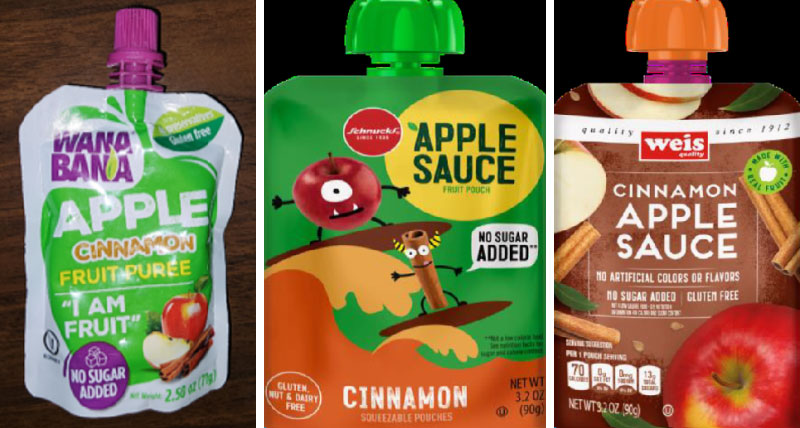This story has been updated since it was originally published on 12/11/23 to include new information
The FDA has issued a recall on three brands of applesauce and cinnamon apple puree products due to elevated levels of lead—and they believe they may have been intentionally contaminated. WanaBana apple cinnamon fruit puree pouches, Schnucks cinnamon-flavored applesauce pouches and variety packs, and Weis cinnamon applesauce pouches have been pulled from shelves.
The FDA is encouraging anyone in possession of any of these products, which were sold across 22 states, to not eat, sell, or serve them, as they could be dangerous. According to the FDA, the contamination may be the result of “economically motivated adulteration” Read on for all of the details.


Fruit Pouch Recall
The FDA began investigating these fruit puree products after receiving reports of elevated lead levels in children. At the time this story is being written, the FDA has reportedly received at least 69 reports of elevated lead levels in children under the age of 6 years old who consumed these products.
It is suspected that the source of these high lead levels is the cinnamon found in these products, which was imported from a manufacturer in Ecuador. Testing Austrofoods, the facility in Ecuador, revealed that the cinnamon contained lead levels as much as 2,000 times higher than the safe amount.
Politico recently reported that this contamination could stem from food fraud, which refers to cheaper ingredients being used in products in order to save money—such as lead-based dyes used to enhance the color of spices.
The following products have been recalled:
- WanaBana apple cinnamon fruit puree pouches, sold at multiple retailers such as Amazon and Dollar Tree.
- Schnucks cinnamon-flavored applesauce pouches, sold at Schnucks and Eatwell Markets grocery stores.
- Weis cinnamon applesauce pouches, sold at Weis grocery stores.
The company is now offering reimbursements of up to $150 to the parents of children affected by the recall. This reimbursement is meant to cover health care visits and blood testing.
View this post on Instagram
Risks of lead exposure
As the FDA notes, high lead levels pose a serious risk to people of all ages and health statuses—especially children. Symptoms of short-term lead exposure include headache, abdominal pain, vomiting, and anemia. Long-term exposure could result in irritability, fatigue, muscle aches, muscle weakness, weight loss, constipation, and more.
"Protecting children from exposure to lead is particularly important because they are more susceptible to lead toxicity," the FDA states. "Most children have no obvious immediate symptoms. Parents and caretakers should consult a healthcare provider if you suspect a child may have been exposed to lead."
In addition to contacting your healthcare provider, it's important to dispose of these products correctly. The FDA provides instructions: "To properly discard the product, consumers and retailers should carefully open the pouch and empty the content into a trash can before discarding the packaging to prevent others from salvaging recalled product from the trash. Clean up any spills after discarding the product then wash your hands."
Staying on top of recent recalls is an important part of keeping you and your family safe and healthy. That's why SheFinds is dedicated to keeping readers updated on the latest product recalls.
Other recent instances include protein bars containing foreign objects and fresh fruit that has potentially been contaminated with salmonella.
Stay safe!
READ MORE: Ice Cream, Yogurt And Gelato Is Being Pulled From Grocery Stores In 4 States Due To Listeria Risk


























